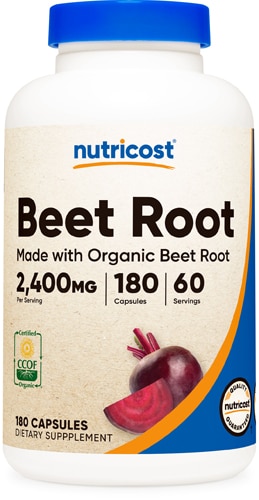[vc_row][vc_column][vc_column_text]Known for its vibrant red color and sweet, earthy flavor,
beetroot is a nutrient-dense vegetable that’s extremely versatile to consume as pre-workout fuel. You can mix beetroot powder into a smoothie or blend it into hummus for a healthy, satiating snack. You can roast beetroot slices for a textural element in your salads or grain bowls. You can even drink beetroot juice for a natural source of antioxidants, phytochemicals, vitamins and minerals.

This humble vegetable is also a nutritional powerhouse—so if it isn’t part of your diet plan already, it’s time to change that. Let’s look at beetroot’s various health benefits and how it can elevate your fitness performance. Plus, learn a few simple, delicious ways to incorporate beetroot into your pre-workout routine.
Health and nutrition benefits of beetroot
According to the
USDA, a 1-cup serving of beetroot contains less than 60 calories and offers a wide range of essential nutrients. Beetroot does have more sugar than many other vegetables (9.19 grams per1-cup serving), but it’s important to note, these are natural glucose and fructose sugars from simple carbohydrates.
In fact, type-2
diabetes patients who ate beetroot for 8 weeks actually noticed their blood sugar levels and other metabolic
markers improve. So unless you consume it in major excess, the sugar content in beetroot will not harm you. Here’s a breakdown of the nutritional profile:
- 119 g water
- 13 g carbohydrates
- 81 g fiber
- 19 g protein
- 442 mg potassium
- 106 mg sodium
- 4 mg phosphorus
- 3 mg magnesium
- 8 mg calcium
- 66 mg vitamin C
- 09 mg iron
Beetroot also has trace amounts of vitamin E, selenium and beta-carotene, which have antioxidant properties. The human body requires antioxidants like these to lower inflammation, bolster immune health and fight oxidative stress.
The nutrients in beetroot provide another significant benefit too: they form nitrate, an organic, bioactive compound that converts into nitric acid when you digest it. Nitric acid promotes healthy cardiovascular tone, blood pressure, respiration and skeletal muscle function, according to the
Antioxidants Journal. Nitric acid also plays a critical role in athletic and fitness performance, which makes beetroot a smart choice for exercise fuel.
†
Beetroot’s impact on fitness performance
A study from the
Journal of the International Society of Sports Nutrition looked at the effect of beetroot supplementation on energy metabolism, circulation, endurance levels and muscular hypertrophy in resistance training workouts.
The researchers found that athletes who took beetroot juice supplements for 5-7 days increased their number of repetitions during three full exercise sets, resulting in a performance boost of 18.9 percent.
†
That’s because nitric acid helps stimulate blood flow to the muscle fibers. This keeps them oxygenated, which can delay the onset of muscular fatigue and allow you to sustain high- intensity exertion for longer intervals, the study continues.
†
More research from
Frontiers in Nutrition reports that nitric acid can support serotonin production, which modulates energy balance and optimizes glucose uptake.
† Both your cardiac and skeletal muscles need glucose to contract normally during exercise.
Finally, the Nutrients Journal analyzed the possible
benefits of beetroot juice supplementation on cardiorespiratory fitness among endurance athletes. The researchers monitored a group of cyclists who took beetroot supplements before a 50-mile training test.
They found a positive correlation between the beetroot and a more efficient cardiorespiratory economy (how well the body converts oxygen consumption into generated power).
†
As a result, the cyclists had enough stamina to decrease the amount of time it took them to travel the entire distance. Their time-to-exhaustion at a maximum intensity of 90 percent VO2 (oxygen consumption) also improved by as much as 16 percent.
All of these studies point to a common thread: beetroot’s nutritional profile and nitric acid concentration may help promote normal heart, lung and muscular function to support your exercise performance.
†
How to incorporate beetroot into your diet
The best part is that beetroot is a highly versatile, adaptable vegetable. This makes it easy to fit more beetroot into your meal plan rotation. Whether you consume it as a whole food or take it in supplement form, here are a few ideas to boost your beetroot intake. From beverages to snacks to lunch or dinner recipes.
- Use beetroot instead of chickpeas as a hummus binder.
- Blend beetroot powder into a smoothie or chia pudding.
- Cook thinly sliced beetroot in an air fryer to make chips.
- Roast beetroot in the oven for salads or grain bowls.
- Mix beetroot powder into waffle or pancake batter.
- Cut raw beetroot spirals to use as a pasta substitute.
- Juice beetroot (or buy pre-made beetroot juice).
- Pickle beetroot in a solution of vinegar and salt.
- Combine beetroot and beans or chickpeas to make veggie burgers.
- Use beetroot as a natural food coloring in desserts.
- Pureé beetroot into a thick and creamy soup base.
- Grate raw beetroot as a crunchy topping for tacos.
Potential dangers of beetroot consumption
While the average person can consume beetroot with no harmful side-effects, those with certain food sensitivities might need to watch their overall intake. For example, both the leaves and root of this vegetable contain dietary oxalate. In some cases, oxalate will
interfere with micronutrient absorption and cause kidney stone formation for those who are susceptible to this condition.
The beetroot is also high in
FODMAPs, short-chain carbohydrates that help feed the bacteria in your gut microbiome. People with irritable bowel syndrome or other gastrointestinal problems cannot tolerate FODMAPs. As such, they might experience inflammation, nausea, digestive pain or other discomfort after eating beetroot.
Enjoy the benefits of beetrootin your fitness and nutrition routine
If you can digest it with none of these adverse complications, beetroot deserves a spot in your diet. The nutritional density of this vegetable makes it a smart choice for healthy eating, while its exercise benefits can take your athletic performance to the next level. Plus, there’s no shortage of delicious, creative recipes to enjoy beetroot!
†These statements have not been approved by the Food and Drug Administration. These products are not intended to diagnose, treat, cure or prevent disease.[/vc_column_text][/vc_column][/vc_row][vc_row][vc_column][vc_text_separator title="Featured Products" border_width="2"][vc_row_inner equal_height="yes" content_placement="middle" gap="35"][vc_column_inner width="1/3"][vc_single_image image="167593" img_size="full" alignment="center" onclick="custom_link" img_link_target="_blank" css=".vc_custom_1688238169329{padding-right: 7% !important;padding-left: 7% !important;}" link="https://www.vitacost.com/dynamic-health-organic-beetroot-juice"][/vc_column_inner][vc_column_inner width="1/3"][vc_single_image image="167595" img_size="full" alignment="center" onclick="custom_link" img_link_target="_blank" css=".vc_custom_1688238187216{padding-right: 7% !important;padding-left: 7% !important;}" link="https://www.vitacost.com/bioschwartz-beets-superfood-powder"][/vc_column_inner][vc_column_inner width="1/3"][vc_single_image image="167594" img_size="full" alignment="center" onclick="custom_link" img_link_target="_blank" css=".vc_custom_1688238209349{padding-right: 7% !important;padding-left: 7% !important;}" link="https://www.vitacost.com/force-factor-total-beets-tablets"][/vc_column_inner][/vc_row_inner][/vc_column][/vc_row]
 This humble vegetable is also a nutritional powerhouse—so if it isn’t part of your diet plan already, it’s time to change that. Let’s look at beetroot’s various health benefits and how it can elevate your fitness performance. Plus, learn a few simple, delicious ways to incorporate beetroot into your pre-workout routine.
This humble vegetable is also a nutritional powerhouse—so if it isn’t part of your diet plan already, it’s time to change that. Let’s look at beetroot’s various health benefits and how it can elevate your fitness performance. Plus, learn a few simple, delicious ways to incorporate beetroot into your pre-workout routine.



